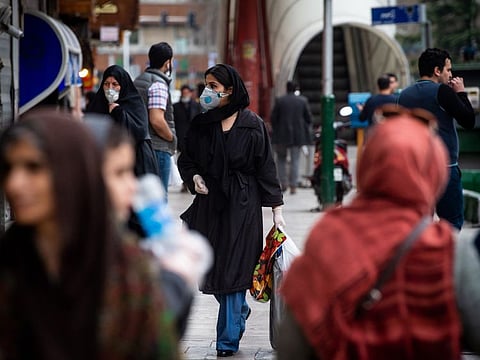Coronavirus: Iran death toll rises sharply as lockdowns deepen across Mideast
Member of powerful Assembly of Experts in Iran succumbs to disease

Tehran: A dire situation in Iran got worse as the country on Monday reported its highest daily toll of deaths from the coronavirus: 129 fatalities, raising the total number of deaths to 850. Experts believe both the number of infections and deaths is far more than is being reported.
Businesses in Iran’s capital remained open, however, even as other countries in the region moved towards full lockdowns, with Lebanon largely shutting down and Iraqis racing to prepare for a curfew set to begin later this week.
The divergent approaches adopted by local authorities reflect continued uncertainty over how to slow the spread of a virus that has infected around 170,000 people worldwide and caused more than 6,500 deaths.
Some have opted for an even more aggressive response. Israel, where the number of confirmed cases has more than doubled to around 250 in recent days, has authorised the use of phone-snooping technology long used against Palestinian fighters to track coronavirus patients. Such practices will spark renewed debate over privacy issues as countries around the world confront the pandemic.
Iraq announced a weeklong curfew late Sunday. People raced to supermarkets and swiftly emptied shelves, while others stocked up on cooking fuel. The curfew, which is set to begin late Tuesday, includes the suspension of all flights from Baghdad’s international airport.
Iraq’s Health Ministry has reported 124 cases of coronavirus and nine deaths.
In Lebanon, where the government ordered a lockdown, traffic was thin and some streets were completely empty on Monday, the start of the working week. Restaurants, cafes and bars have been closed since last week and most private businesses were shuttered Monday.
Police asked shop owners to close in line with the government orders and moved to clear the few remaining people from Beirut’s seaside corniche. Pharmacies, bakeries and other food sellers were allowed to stay open. The small country has reported 99 cases and three deaths.
Both Iraq and Lebanon have been largely in disarray since anti-government protests broke out last year, and Lebanon was mired in its worst financial crisis in years even before the pandemic began.
One of the worst outbreaks in the world has unfolded in Iran, which has close ties to both Iraq and Lebanon. Authorities there have reported 14,991 confirmed cases and 853 deaths. Monday’s jump in fatalities was the largest one-day rise since the epidemic began. The real numbers may be even higher, as some have questioned the government’s reporting.
Cafes open
Many Iranians have dismissed fears about the virus and advice from public health officials to avoid social contact. Restaurants and cafes have remained open, though business has diminished.
A member of the Assembly of Experts, which has the power to appoint or dismiss the country’s supreme leader, died from the illness caused by the virus, the semi-official Fars and Tasnim news agencies reported Monday.
Ayatollah Hashem Bathaei, 78, is the latest of several Iranian officials to have died. Cabinet ministers, members of parliament, Revolutionary Guard members and Health Ministry officials have caught the virus, compounding fears about Iran’s response to the pandemic.
Supreme Leader Ayatollah Ali Khamenei, who is 80 years old and has been in power since 1989, wore disposable gloves at a recent public event, apparently as a precaution.
The official leading Iran’s response to the virus on Sunday expressed concerns that health facilities could be overwhelmed if the rate of new cases continues to climb.
Egypt suspends flights
Egypt has reported 150 cases, including 70 foreigners, and three deaths. It suspended all flights in and out of the country starting Thursday and lasting until the end of the month.
The Palestinian National Authority, which governs parts of the Israeli-occupied West Bank, said anyone entering the territory would be placed in quarantine for 14 days. The Palestinians have reported nearly 40 cases, most linked to an outbreak in the town of Bethlehem.
Jordan has announced similar measures, saying travellers arriving in the country will be quarantined at hotels on the Dead Sea and in the southern Red Sea city of Aqaba.
In Saudi Arabia, the capital and other cities announced the closure of malls, cafes and parks, allowing only grocery stores and pharmacies to stay open and limiting restaurants to delivery. Saudi Ministry of Health reports 15 more cases.






